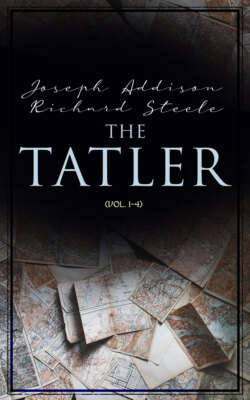Читать книгу The Tatler (Vol. 1-4) - Joseph Addison - Страница 154
St. James's Coffee-house, July 11.
ОглавлениеLetters from the Hague of the 16th instant, N.S., say, that the siege of Tournay went on with all imaginable success; and that there has been no manner of stop given to the attempts of the Confederates since they undertook it, except that by an accident of firing a piece of ordnance, it burst, and killed fifteen or sixteen men. The French army is still in the camp of Lens, and goes on in improving their entrenchments. When the last advices came away, it was believed the town of Tournay would be in the hands of the Confederates by the end of this month. Advices from Brussels inform us, that they have an account of a great action between the malcontents in the Vivarez, and the French king's forces under the command of the Duke of Roquelaure, in which engagement there were eighteen hundred men killed on the spot. They add, that all sorts of people who are under any oppression or discontent do daily join the Vivarois; and that their present body of men in arms consisted of six thousand. This sudden insurrection has put the Court of France under great difficulties; and the king has given orders, that the main body of his troops in Spain shall withdraw into his own dominions, where they are to be quartered in such countries as have of late discovered an inclination to take up arms: the calamities of that kingdom being such, that the people are not by any means to be kept in obedience, except by the terror of military execution. What makes the distresses still greater, is, that the Court begins to be doubtful of their troops, some regiments in the action in the Cevennes having faced about against their officers; and after the battle was over, joined the malcontents. Upon receiving advice of this battle, the Duke of Berwick detached twelve battalions into those parts, and began to add new works to his entrenchments near Briançon, in order to defend his camp, after being weakened by sending so great a reinforcement into the Cevennes. Letters from Spain say, that the Duchess of Anjou was lately delivered of a second son. They write from Madrid of the 25th of June, that the blockade of Olivenza was continued; but acknowledge, that the late provisions which were thrown into the place, make them doubt whether they shall be masters of it this campaign; though it is at present so closely blocked up, that it appears impracticable to send in any more stores or succours. They are preparing with all expedition to repair the fortifications of Alicante, for the security of the kingdom of Valencia.
392. It appears from Luttrell's "Brief Relation," that in Feb. 1707, Commissioners sat in the Exchequer Room at Westminster to try whether Viscount Wenman, "aged 19, of £5000 per annum estate in Oxfordshire," were an idiot or not. On the 14th February the Commission was superseded. In June 1709, a new Commission passed the Great Seal for inquiring into the Viscount's idiocy, and on July 29 they found that he was no idiot. On July 12, Peter Wentworth wrote thus to Lord Raby: "The prosecution of Lord Wainman is now order'd again, upon wch the Tatler is to day; the accation I am told is this, that last year when there was a stopt put to't 'twas upon the intercession lady Wainman the mother made to the Queen, and that she designed to marry her son, the fool, to Sir John Packington's daughter, 'twas then said that my Lady her self had married her Butler, wch the Queen desired her to tell the truth, and she did assure the Queen upon her word and honour,'twas false, and she never intended any such thing, but of late she has own her marriage to that same Butler, and put off the match with Sir John P——daughter, and married him to her husband's sister, wch they say the Queen is angry at and therefore this fresh prosecution is order'd" ("Wentworth Papers," p. 93). Lord Wenman, the fifth Viscount, was born in 1687, married Susannah, daughter of Seymour Wroughton, Esq., in 1709, and died in 1729. Lord Wenman's brother-in-law, Francis Wroughton, was also his father-in-law, for he had married, in 1699, as her third husband, the Viscount's mother, the Countess of Abingdon.
393. The Scowrers and Roarers were the forerunners of the Mohocks of 1712. Shadwell wrote a play called "The Scowrers," and often alludes to the window-breakers of his time. See Gay's "Trivia," iii. 325:
"Who has not heard the Scowrer's midnight fame?
Who has not trembled at the Mohock's name?"
394. "Essay concerning Human Understanding," chap. xii. sect. 14.
395. See Nos. 6, 35.
396. "Brennoralt," act iii.
397. "Paradise Lost," iv. 12, 13.
